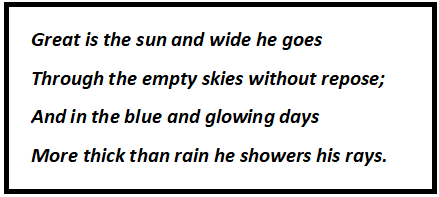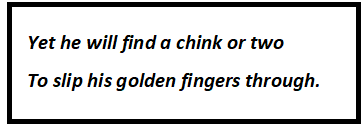Hi Everyone!! This article will share Summer Sun Questions & Answers.
This poem is written by Robert Louis Stevenson. In my previous posts, I have shared the questions and answers of The Old Gumbie Cat, The People Upstairs and A Ballad of Mystic Memories so, make sure to check these posts as well.
Summer Sun Questions & Answers
Word Galaxy
- Repose – rest
- Parlour – a room to meet guests in; a sitting room
- Hayloft – the upper floor of a farm building used for storing hay
- Inmost nook – a deep hidden corner
- Chink – a crack
- Footing true – a steady and balanced way of walking
- Spider-clad – full of spiders
Question 1: Why does the speaker uses the expression ‘wide he goes’?
Answer: The speaker uses the expression ‘wide he goes’ to show that the sun travels all around and showers its light on the Earth.
Question 2: Why are the blinds closed? What does the Sun do when this happens?
Answer: The blinds are closed to keep the scorching sun rays out so as to keep the room shady and cool. However, the Sun still finds its way to enter the room through a narrow crack or opening and fill it with light.
Question 3: What does the sun do in the duty attic? Is it welcome there? How do you know?
Answer: The sun rays enter the dusty attic through the tiny keyhole and shine upon the spider which spends its days in darkness.
Yes, it is welcomed in the attic as the spider feels glad when it spots the sunlight. It is clear from the line ‘He through the keyhole, maketh glad’, which shows that when Sun enters the attic, the spiders become happy.
Question 4: Where does the sun shed ‘a warm and glittering look’?
Answer: The sun sheds ‘a warm and glittering look’ in the darkest and coldest corners where the ivy plant grows in the garden.
Question 5: How does the Sun ‘please the child’?
Answer: The Sun pleases the child by painting the sky in the beautiful different shades of red and making everything bright and sparkling.
Summer Sun Questions & Answers
Question 6: Why do you think the sun is called the ‘gardener of the world’?
Answer: The sun is called the ‘gardener of the world’ because it is the ultimate source of energy for both plants and animals. The presence of the sun makes the tree bloom whereas, in autumn and winter season, the trees shed their leaves due to lesser sunlight in comparison to the summer season.
Question 7: Read the lines and answer the questions:

(a) What do you think the poet mean by ‘empty heaven’?
Answer: The poet means a cloudless sky by the expression ‘empty heaven’.
(b) Why are rays described more thick than rain?
Answer: The rays are described more thick than rain because they are strong and capable of getting through most things.
(c) Why did he shower his rays in the blue and glowing days?
Answer: The sun showers his rays in the blue and glowing days because on such days, the sky is free of clouds.
Question 8: Read the lines and answer the questions:

(a) Who will find the chink? Where was he supposed to find a chink?
Answer: The sun will find the chink. This chink is to be found between the blinds and the curtains that have been pulled down to keep the sun out of the room in the house.
(b) What do you think the poet means by the ‘golden finger’?
Answer: The poet refers to the rays of the sun through the expression ‘golden finger’.
(c) Why was he being kept out?
Answer: The sun was being kept out so that the room could be kept cool.
Question 9: Write True or False:
(a) We can keep the sun out by closing the blinds – False
(b) The sun brightens the dusty attic – True
(c) The sun makes the hills look blue – False
(d) The sun makes the ivy shine – True
(e) The sun shines over a large area – True
(f) The sun paints the roses with a brush – False
Question 10: Write a few pairs of rhyming words from the poem.
Answer: Clad-glad, around-ground, look-nook and blue-true.
So, these were Summer Sun Questions & Answers.